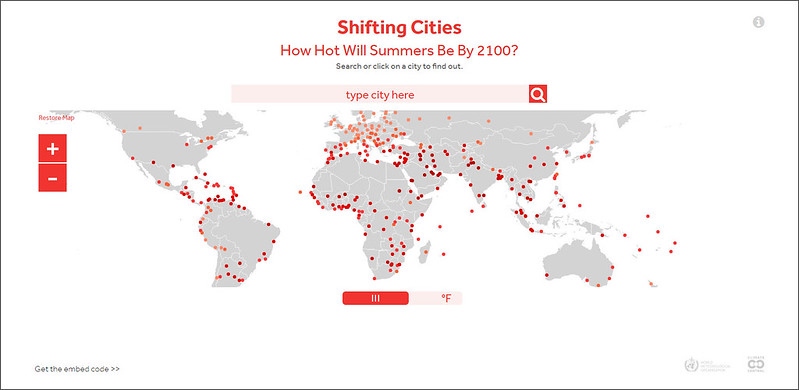Canadian summers may turn tropical due to climate change
Meteorologist/Science Writer
Thursday, July 6, 2017, 1:52 PM - While Canada receives its fair share of summer heat, under the influence of unrestrained climate change, residents of our largest cities will likely be contending with tropical summers by the end of the century.
There's no getting around it. Although there is some year-to-year variability to global temperatures, there is an unmistakable trend that shows our planet is getting hotter, and after carefully scouring the evidence for all the possible sources for this warming, scientists have definitively identified human activity as the cause - namely the digging up and burning of fossil fuels.
As the planet warms, the added greenhouse gases from burning fossil fuels are trapping heat in the atmosphere and skewing the normal spread of temperatures that we experience throughout the seasons, giving us fewer extreme cold days and more extreme hot days.
Exactly how hot is it likely to get, though? Read on.
A new post by the Climate Central blog presents an interactive map, which combines both the projected temperature rise from global warming and the effects of the urban heat island generated by cities, to give us a look at what summers could be like in various cities around the world by the end of this century, if we do not take actions to curb climate change.
Click on the image below to interact with Climate Central's map (opens in a new tab), and explore the temperature changes for Toronto, Vancouver, Calgary, Ottawa and Montreal.
Click on any city indicated on the map, or type in the name of one of those cities in the search field. The map will then zoom in, showing you what that city currently experiences, on average, during the summer months. At the same time, it will draw a line from your chosen city to another city on Earth, where the current temperatures match what your chosen city is expected to see by the year 2100.
Click on the button that appears at the bottom (labelled "What about with moderate emission cuts?"), and it will draw a second line to another city with the summer weather that best represents what Summer 2100 will be like for your chosen city if we do act to curtail the worst impacts of climate change.
The overall conclusion: Without swift action to limit climate change, Canadians in the most populous region of the country (the Windsor to Montreal corridor) will be able to have a tropical summer simply by staying at home. Population centres in other regions of the country, such as in the Prairies, on the west coast and on the east coast, may avoid dipping into the tropics, but their average summer temperatures will still climb significantly (for example, Calgary will feel more like Los Angeles).

Average daytime summer temperatures for five major Canadian cities, now, and in the future, with and without action against climate change. Data from Climate Central.
This will mean changes in storm activity, rainfall amounts, water availability and potential drought, as well as species migration (plant, animal and microbe), but these tropical or sub-tropical summer temperatures will also give rise to more, more prolonged, and more intense, heat waves.
While the other effects are a concern, heat waves represent a direct threat to life, as the exceptional heat and humidity during one of these episodes can exacerbate breathing problems for those suffering from asthma and lung disease, they can cause heat stress or even heat stroke in those who are exposed to these conditions too long, and if exposure is prolonged, it can even cause death.
Related: What ingredients are necessary for an official heat wave?
Even with climate action, we are still locked in to a certain amount of warming, based on how much greenhouse gases we've already added to the atmosphere. If we do act, though, at least Canada can stay firmly rooted in the temperate climate zone by the end of this century.
Source: Climate Central




